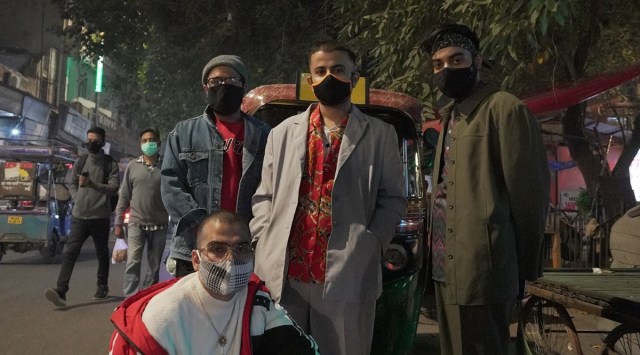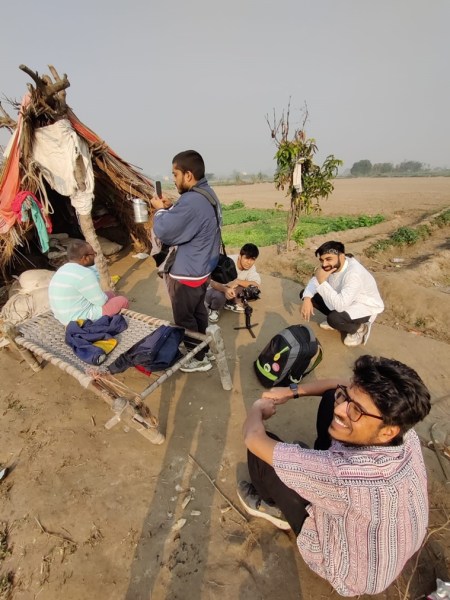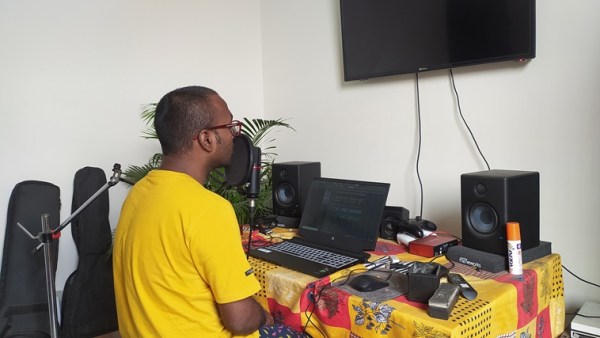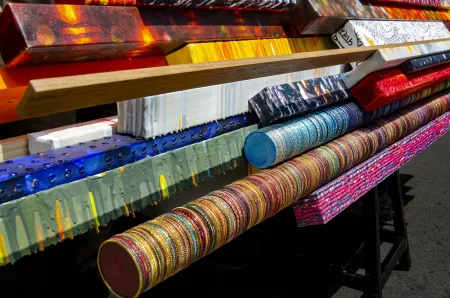- India
- International
Songs of hope: Delhi’s J Block collective brings together artistes to share beats, life and more
Often referred to as “Delhi’s underground artistes”, the members, however, shy away from being “categorized”. The collective has brought out songs like ‘Kalla Killah’ that explores the LGBTQ experience and ‘Faqeeran’, which takes inspiration from Punjabi poet Shiv Kumar Batalvi.
 Members of the J Block during a shoot for the song 'Faqeeran', featuring Aatmbodh (L), Lonekat (M), Faichan (R) and Siddhant. (Photo courtesy: Waris)
Members of the J Block during a shoot for the song 'Faqeeran', featuring Aatmbodh (L), Lonekat (M), Faichan (R) and Siddhant. (Photo courtesy: Waris)In his first song with the music collective, J Block, Siddhant proclaims, “Queer haan mai, paaji insaan v” (I am queer, brother, a human too). ‘Kalla Killah’ is Siddhant’s story laid bare for every listener that chances upon the song. It’s a story he was able to share with the world once he met a community of music producers and artistes who strive to provide a safe space for people to “just be themselves.”
Named after the J Block in Delhi’s Sarita Vihar, the music collective came together in the first lockdown during the onset of the Covid-19 pandemic, when two artistes, Lonekat (31) and Aatmbodh (26), moved in together to make music. While the duo has relocated to another part of the city now, their house continues to welcome everyone looking for a respite or a professional collaboration.
For Siddhant, however, the collective became the birthplace of an artiste. He ended up singing with Lonekat, an artist name used by Siddharth Sengupta, at a friend’s party one day, striking what was to become a friendship of shared sorrows, strengths, and worldviews. Once Lonekat invited him to J Block and Siddhant recalls, “I was just quiet. I observed everyone and went back. But something touched me that night and I felt like I should write, I have a lot to say.”
Having found a space to unleash his thoughts, Siddhant, who hails from Rajasthan’s Hanumangarh, says, “I wanted to mention that ‘yes, I am queer’ – I wanted to be so open about it. I wanted to say it so people would start dealing with it. I exist man, this is me. You can’t be ill-treating me anymore.” After the song’s release, the 26-year-old says he feels like he has a “super-power” now. “I am so happy about it. People message me about their experiences and I tell them we are in this together.”
While ‘Kalla Killah’ is a heart-wrenching rendition of the LGBTQ+ experience, a song like ‘Ghamandi’ examines the politics around the pandemic. With verses of Punjabi poets like Shiv Kumar Batalvi and Hazrat Sultan Baahu, the J Block explores the talents of its various members through genres like rap, folk, hip hop and lo-fi – sometimes fused together.

The collective also produces its own music videos, offering surreal visuals such as in ‘Baahu’ and trippy digital artworks. Songs like ‘Sukoon’ and ‘Saer’ offer a glimpse into the J Block house, its residents and the Sarita Vihar locality. While ‘Faqeeran’ follows the artists through the streets and markets of Paharganj – representative of the city’s young crowd that forms their audience.
 Adam (R), Faizan (2nd from R) and Kabeer (L) during a shoot for a music video. (Photo courtesy: Adam)
Adam (R), Faizan (2nd from R) and Kabeer (L) during a shoot for a music video. (Photo courtesy: Adam)
Often referred to as “Delhi’s underground artists” in music circles, the members, however, shy away from being “categorized”. “A commonality between all the songs that have come out from J block is that there has not been any way to box the artist,” says Faizan Rahman alias Faichan, a 22-year-old music producer from Delhi. Adam Bo alias Aatmbodh adds, “In big studios, the central motivation is profit. Here, the central motivation is mostly this mutual respect that people have for each other. That’s why the kind of stories that come out are very different, and even the genre is very different. So, if you will see, ‘Kalla Killah’ is very different from ‘Bohot Kede’ and that is entirely different from ‘Thehra’ that Faizan released, recently.”
Siddharth adds that while they do have more control over the song and its visuals, being an independent collective comes with its own challenges “like arranging equipment and actors, because we have limited funds — less than what we might have in association with a big name.”
However, the members have tried to overcome this challenge by pooling resources. “It’s like a co-op, for the ones who are in it,” says Siddharth, a digital marketer by profession. He adds that apart from their own music video and gigs, they make money through paid projects, offering creative solutions, from videos to soundtracks, to brands and artists. “It’s just a very self-sustaining thing where everybody is taken care of. We all pool in,” he says.
View this post on Instagram
The collective, Siddhant says, is like a “family that pushes you to be the best version of yourself.” The sentiment is shared by several members. Abhishek Vishwakarma, who prefers to go by his artist-name Kabeer or Lil Kabeer, shares: “I had gone there for four days but ended up staying for 12. Woh to heaven ki tarah tha bilkul, har taraf music ka cheez ho raha hai (It was like heaven where music was being produced in every corner). It’s a great bunch of producers and sound engineers. I have even improved my sound with them.”
Hailing from Kanpur, Kabeer (22) found the collective when he needed a place to stay in Delhi during a shoot for a music video. At the time, the rap artiste did not have funds to book a hotel and Waris (another member of the collective) set him up at J Block.
Kabeer was a self-admittedly “alag sa bacha”, an outsider, during his schooltime as he was the only one among his peers who’d spend his time listening to rap music. Though he secured the first rank in Uttar Pradesh in a Class 10 Olympiad and had an interest in coding, by the end of Class 12, Kabeer knew he wanted to make a career in music. His parents, who are tailors by profession, supported his decision.
 Kabeer produces music with his set-up at home.
Kabeer produces music with his set-up at home.
However, now, a “community” has become the backbone of the 22-year-old’s music career. While his first laptop was bought by his parents, putting together their savings, Kabeer’s set-up now includes a mic, gifted by a friend, and an upgraded laptop, bought through a crowdfund. Through J Block too, he says, “I found friends who uplift me in a city which was unknown for me.”
Siddharth goes on to explain that since the collective began during the lockdown and “with the kind of isolation that a lot of us had faced mentally because of Covid-19, J block had in fact, become a safe space for a lot of people. The thought process behind it was simply, hum sub dost ek saath rahenge (all of us friends will stay together) and take care of each other.” Siddharth recounts times when there have been 10 people staying together and even giving job interviews.
For Faizan, who has permanently shifted to the residence, J Block became “a space where I could collaborate with other people, even artists that I have looked up to. It used to be a friend’s house that started feeling like my own house and then it literally became my house.”
Faizan, Adam and Siddharth share a vision for the collective to keep growing and adding to its talent pool. Adam hopes that they’d soon be able to have everyone work at it full time while continuing to get funds on their terms. Siddhant adds, “Our dream would be for one of us to blow up, be a globally known artiste, so we can do more. Each one of our individual careers will have all of our hands in it.”
More Lifestyle
Apr 23: Latest News
- 01
- 02
- 03
- 04
- 05


































